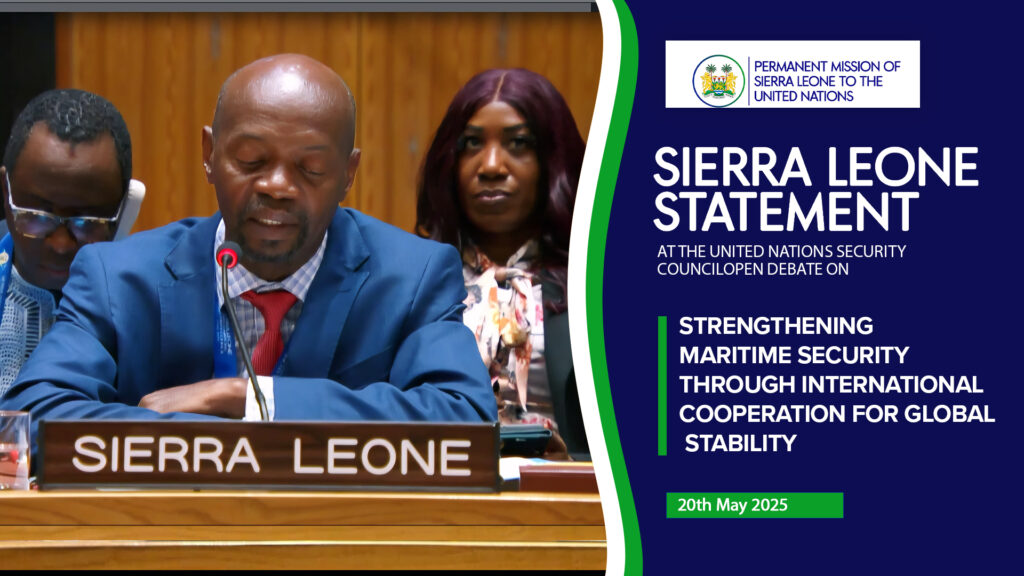Thank you, Mr. President, Your Excellency Kyriakos Mitsotakis, Prime Minister of the Hellenic Republic.
I warmly welcome you to the Security Council.
I thank the Secretary-General, His Excellency Mr. António Guterres, for his comprehensive and insightful briefing. I also acknowledge the valuable contributions of Ms. Melina N. Travlos, President of the Union of Greek Shipowners and Chair of the Neptune Group of Companies, and Professor Christian Bueger of the University of Copenhagen and UNIDIR.
Sierra Leone welcomes this timely and urgent debate on maritime security, an issue of increasing global concern and a persistent threat to international peace and security. From coastal to landlocked nations, all Member States are affected by the far-reaching consequences of maritime insecurity, which disrupts international navigation, trade, and supply chains. A coherent and forward-looking response by the Council is, therefore, imperative.
With over 80% of global trade by volume and over 70% by value transported by sea, representing nearly US$14 trillion annually, maritime supply chains remain the backbone of the global economy. However, shifting geopolitical realities, technological transformations, and the intensifying impacts of climate change are exposing new and complex vulnerabilities in the maritime domain.
In this context, Mr. President, Sierra Leone wishes to highlight four critical and interconnected dimensions that demand a holistic and cooperative response. First, maritime security threats are transnational and multifaceted, requiring cooperative responses beyond the capacities of individual States. From piracy and terrorism to transnational organized crime, maritime threats involve a broad array of actors, including armed groups, terrorist organizations, and criminal syndicates, that operate within and beyond national waters.
Modern-day piracy alone is estimated to cost the global economy US$25 billion annually, threatening shipping routes, endangering civilian lives, and sowing instability in coastal communities. Critical areas such as the Gulf of Aden, the Red Sea, the Gulf of Guinea, and waters off the coast of Venezuela remain particularly at risk.
Transboundary “blue crimes” such as illicit trafficking (including arms, narcotics, and persons), illegal, unreported and unregulated (IUU) fishing, and marine pollution also demand collective and sustained responses.
On the African continent, the African Union has taken important steps to strengthen maritime governance and safeguard Africa’s blue economy. The 2016 Lomé Charter on Maritime Security and Safety and Development has provided a regional framework for countering maritime crime, promoting cooperation among coastal states, and encouraging the ratification of relevant international instruments.
In West Africa, collaborative efforts among states, civil society, institutions and UN agencies such as the FAO have led to strengthened regulation of transshipment, a major driver of IUU fishing. These measures help protect livelihoods in coastal communities across countries such as Ghana, Liberia, Mauritania, Senegal and my country Sierra Leone.
To address emerging threats, Sierra Leone underscores the need to reinforce cooperation under regional frameworks like the Djibouti Code of Conduct and the Yaoundé Architecture, which must be supported through clear mandates, sustainable financing, and inclusive participation by littoral States. The leadership of the International Maritime Organization (IMO) remains vital in setting technical and normative standards.
Climate change, more than any other factor, has heightened maritime insecurity through rising sea levels, intensified weather events, and increased natural disasters, all of which disrupt maritime operations and exacerbate poverty and instability. These challenges demand integrated, anticipatory responses rooted in risk mitigation and resilience-building.
Second, geopolitical rivalries are compounding maritime insecurity, especially in contested or resource-rich waters. Heightened military presence, competing territorial claims, and disputes over maritime rights and boundaries risk escalating tensions.
The assertion of maritime claims without regard for international law may aggravate conflict and compromise navigational safety. In such situations, diplomacy, de-escalation, and adherence to the United Nations Convention on the Law of the Sea (UNCLOS) are essential to uphold peace and stability.
Third, effective responses to maritime threats require alignment and coordination across global, regional, and national levels. While UNCLOS and Security Council Resolutions, 1816 (2008), 1838 (2008), 2015 (2011), and 2380 (2017), provide important guidance, they must be coherently implemented alongside regional instruments, national legislation, and operational strategies.
Greater inter-agency coordination and information sharing are needed to avoid duplication and close existing operational gaps. Aligning national maritime strategies with global security and development frameworks, including the role of Regional Economic Communities (RECs) and regional mechanisms, is essential.
Sierra Leone calls for enhanced cooperation, including technology transfer, technical assistance, and capacity-building through partnerships with the IMO, FAO, UNEP, UNODC, and others. As a concrete example, access to the European Frontex information-sharing system could support the development of similar regional platforms.
Leveraging innovation and technology is also key. Tools such as satellite-based monitoring, AI-driven vessel tracking, blockchain-secured trade documentation, and unmanned systems are revolutionizing maritime domain awareness. However, such technologies must be governed by robust regulatory frameworks, transparency, and data protection protocols. Public-private partnerships will be critical, particularly in supporting developing countries’ access and implementation.
Fourth, national authorities must strengthen judicial and law enforcement capacities to tackle the nexus between maritime crime, terrorism, and trafficking. This includes the establishment of joint maritime task forces, enhanced prosecutorial cooperation, and development of legal frameworks for maritime crime adjudication.
Capacity-building must also focus on coastal surveillance, interoperability among maritime forces, and human capital development. Education, training, and infrastructure upgrades are vital to sustain long-term resilience.
Mr. President,
In conclusion, Sierra Leone reiterates its support for the Secretary-General’s New Agenda for Peace, which advocates an integrated approach to peace and security, including maritime security, within the broader development framework. We also align ourselves with the commitment in the Pact for the Future, which calls for more effective global governance to address interconnected maritime challenges, from sustainable development and trade to climate resilience and transnational crime.
The seas are our shared lifeline. Therefore, safety and stability remain our collective responsibility. As we navigate these challenges together, let us reinforce international cooperation that upholds peace, development, environmental stewardship, and the rule of law.
I thank you.



